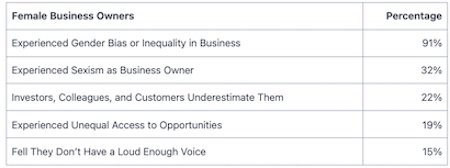Diversity, Equity and Inclusion in Startups Shared Values Have Business Benefits
Diversity, Equity and Inclusion in Startups: First of all, I suggest that you read my piece on Inclusive Entrepreneurship that discusses the ‘missing venture founders’, who are people who would like to start new businesses, but continue to be seriously disadvantaged and hampered in their aspirations. The categories of such people include, but are not limited to: women, young people, seniors, immigrants and racial minorities, as well as people with disabilities, those with low/no income or without wealth, and those who live in rural areas.
that discusses the ‘missing venture founders’, who are people who would like to start new businesses, but continue to be seriously disadvantaged and hampered in their aspirations. The categories of such people include, but are not limited to: women, young people, seniors, immigrants and racial minorities, as well as people with disabilities, those with low/no income or without wealth, and those who live in rural areas.
Diversity, Equity and Inclusion (DEI) programs in Government and major corporations are not only threatened or being eliminated1, but the behaviors by many managers in large public and private organizations are reverting to more exclusive rather than inclusive employment practices—to the detriment of all. This negative trend is not echoed in civil society in general, where increased tolerance and inclusiveness is prevalent.
The music industry is a case in point. At the 2025 Grammy Awards ceremony, for example, inclusiveness was evident right throughout the celebration and performances. Towards the end of the broadcast, it was significant that Alicia Keys’ acceptance speech for her Global Impact Award gave support to the policy when she declared, “DEI is not a threat, it’s a gift”.
Diversity, Equity and Inclusion in Startups are initiatives that are vital for success, and above all, to foster a positive work culture. In addition, exposure to diverse perspectives will support effective employee hiring, promote ethical entrepreneurship, and encourage problem solving and innovation. DEI was conceived for reasons of fairness and equal opportunity. It was not conceived as a way to hire less-qualified minorities in the place of more highly-qualified white males, but rather to ensure less-qualified white males were not hired in place of more highly-qualified candidates of diverse and disadvantaged backgrounds. The same principles were envisioned to permeate work attitudes and behavior.
DEI Policies & Practices Benefit Entrepreneurs
Among compelling outcomes from DEI practices that can benefit entrepreneurs are:
-
Above Average Profitability: Firms with diverse executive teams have above average profitability compared with those with less diversity in their executive teams (DEI in the Workplace, 2023);
-
Better Decision-Making: Diverse teams consider multiple viewpoints, leading to more innovative solutions (Rock & Grant, 2016);
-
Stronger Workplaces: Inclusive environments boost employee engagement, retention, and productivity (Deloitte, 2018);
-
Organizational Success: Embracing diverse viewpoints lead teams to achieve transformative results (Inclusion Learning Lab, 2024);
-
Economic Growth: Companies with diverse leadership outperform less diverse competitors financially (McKinsey & Company, 2020).
Entrepreneurs Make a Collective Difference
If do your own research on Diversity, Equity and Inclusion in Startups, I fully expect you will encounter very similar evidence of outcomes to those listed above.
Entrepreneurs may have less powerful voices than major corporation CEOs and, individually they do not indulge in lobbying, but small businesses employ nearly half of the American workforce. The 33.2 million small businesses in America make up 99.9 per cent of all firms across the country and represent 43.5 per cent of America’s GDP—thus their impact on society is huge.
Hence a positive approach to DEI in small businesses, including startups, will have a significant impact. For us all to thrive, we need a society of fairness, empathy and compassion. Entrepreneurs can play a large part in achieving them both within their own ventures and in society as a whole.
Women Entrepreneurs in Business Life
We still have a long way to go on Diversity, Equity and Inclusion in Startups, and to ensure we respect and encourage aspiring entrepreneurs in disadvantaged groups in the US. As an example, the statistics about Women in Business in 2024 reveal a tough reality for female founders.
in disadvantaged groups in the US. As an example, the statistics about Women in Business in 2024 reveal a tough reality for female founders.
Of course, many exclusive behaviors are unintentional, but many behaviors in the table will have been experienced by women in business. Imagine the difficulties faced by female founders if, in addition, they fall into other categories of disadvantage.
The data shows some glaring reasons for establishing DEI practices on a much wider scale, as a matter of dignity and fairness to the benefit of society as a whole. The National Association of Women Business Owners are a powerful agent of change that are doing plenty to support the inevitability of DEI becoming the norm in business practice.
Here are of three other examples in the case of female founders experiencing male exclusivity:
- The average loan size for women-owned firms is 50% lower than for male-owned;
- Only 2.4 per cent of venture capital funding goes to female founders in the US2;
- 31 per cent of women business owners have school-aged children at home.
Advantage of Diversity, Equity and Inclusion in Startups
In addition to the benefits that startup entrepreneurs gain from establishing DEI policies and practices, particularly at the outset of the new business, they have a considerable freedom to institute the policies based upon their own convictions, especially if they aim to startup for good.
Founders also have the likelihood of being able to ensure those policies are converted into practices and behaviors. They can make the intent a reality, much more easily than an established enterprise’s management can. Blithe corporate aspirations that may not have full support and conflicting employee attitudes or conduct will be much more likely to frustrate established businesses that institute DEI programs.
I can attest to that from personal experience. Soon after my partner and I founded my first startup over 40 years ago, we were able to work with our team to establish and implement what we called our shared values in ‘tablets of stone’.
ago, we were able to work with our team to establish and implement what we called our shared values in ‘tablets of stone’.
Indeed, I actually had tablets of stone carved with the ten commandments for each employee, as a coaster for their coffee mugs.
Our collectively created commandments were:
- People and Profits
- We Are Our First Customers
- Benefits Not Badmouth
- Market Driven with Values
- Everyone Carries Boxes
- Everyone Sells
- Fun Matters Too
- Responsible in Community
- Success to Empower Others
- Profits and People
Openly Shared Values
We established and maintained a commitment to shared values, based on mutual respect. Of course, there were moments when we stumbled. When we did, we openly discussed the ways in which we faltered and made efforts to do better. Our experience was that our openly shared values created an implicit as well as an explicit business moral compass. It resulted in an ability to achieve the five outcomes listed above.
The concepts of diversity, equity and inclusion were not openly discussed back then, but they were implicit in the shared values. In the future, startups are likely to set a high priority for DEI policy and practices, both for moral reasons and to achieve good business outcomes.
Notes
- By February 2025 the list of companies backpedaling on DEI included Amazon, Ford, Harley-Davidson, John Deere, Goldman Sachs, Google, Loews, McDonald’s, Meta, Target, Tractor Supply, and Walmart.
- Though it’s clear that DEI won’t magically fix this, it will be part of the solution as it impacts business, including the venture capital industry. In the meanwhile, take a look at the Venture Founders Directory of Funders for Female Founders—USA, where I list more than 70 such funders.





